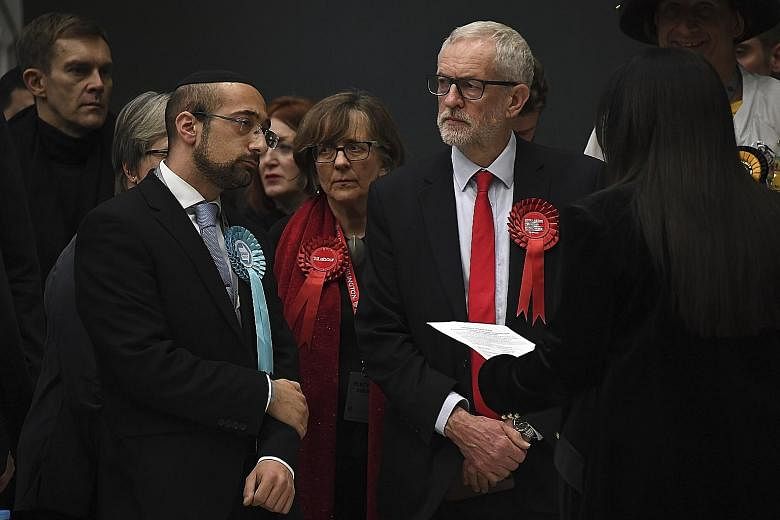LONDON • Labour leader Jeremy Corbyn said yesterday that he would stand down as results showed his party faced its worst electoral defeat in 84 years.
But he did not set a date for his departure, insisting that he would remain in charge during a period of reflection for the party.
Critics have blamed a collapse in support in traditional Labour strongholds on Mr Corbyn's equivocation over Brexit, and said many voters cited their dislike for him on doorsteps across the country.
That has left Labour, a 100-year-old party born out of the trade union movement, wrestling with what went wrong and what to do about it.
"I will not lead the party in any future general election campaign," Mr Corbyn said in his north London constituency, where he comfortably held on to his seat.
Describing the results as "very disappointing", the 70-year-old party leader added: "I will discuss with our party and ensure there is now a process of reflection on this result and the policies that the party will take going forward."
Exit polls showed voters had gone with Conservative Prime Minister Boris Johnson's "Get Brexit Done" promise and pro-market philosophy and rejected left-wing veteran, Mr Corbyn, who had promised a second Brexit referendum and a radical expansion of the state.
An avowed socialist who took control of the party after a bruising 2015 election defeat, Mr Corbyn has shifted Labour sharply away from the centre ground that underpinned three Labour majority governments led by Mr Tony Blair.
During four years in charge, Mr Corbyn built an ultra-loyal support base, pushing centrist members to the fringes and creating an ideological schism that critics say has alienated many of the Labour party's traditional working-class voters. An ardent pro-Palestinian activist, he has also been accused of failing to address accusations of anti-Semitism among his supporters.
"Corbyn was a disaster on the doorstep... everyone knew he couldn't lead the working class out of a paper bag," said Mr Alan Johnson, who served as a senior minister under Mr Blair.
Underlining the likely looming battle for the future of the party, Corbyn loyalist Richard Burgon said the party should not turn back towards the centre ground.
"We need to fight back, not triangulate," Mr Burgon, the party's justice spokesman, said. "People on the doorstep weren't complaining about our policies, and we wouldn't have had the policies... if it weren't for Jeremy's leadership," he said.
Like the party leader, Mr Burgon blamed the focus on Brexit and negative media coverage of Mr Corbyn for the election loss.
But results showed that Labour's heartland in former industrial areas of central and northern England - areas that typically voted for Brexit - had swung towards Mr Johnson's Conservatives. Labour lost seats it had held for decades, such as Blyth Valley in northern England, which had been Labour since it was formed in 1950, and Wrexham, the Welsh seat that had voted for the party each election since 1935.
The narrow favourite in the race to be the new Labour leader appears to be Mr Keir Starmer, 57, a former director of public prosecutions in England and Wales. He became an MP in 2015 and has served as shadow Brexit minister for three years. He is popular among the anti-Brexit and centrist factions of the party, but is less liked among those new members attracted by Mr Corbyn's radicalism.
Mr Starmer's biggest threat in any leadership contest appears to be 40-year-old Rebecca Long-Bailey, a Corbyn loyalist who has long been seen as his natural successor.
The daughter of a docker from Manchester, north-west England, Ms Long-Bailey has the credentials to win back disaffected voters in Labour's traditional working-class heartland, while maintaining the backing of Mr Corbyn's supporters.
Ms Long-Bailey has also deputised for Mr Corbyn at the weekly Prime Minister's questions in Parliament.
But given the waning star of the veteran leftist, it is unclear how much influence he will have over the process to pick a successor.
Much could depend on whether the trade unions that prop up the party decide they want it to move towards the centre in a bid to beat the Conservatives after such a crushing defeat.
Another top candidate would be the combative 39-year-old Angela Rayner, who describes herself as being part of Labour's "soft-left" wing and served in Mr Corbyn's top team for three years after being elected in 2015.
Ms Emily Thornberry, 59, Mr Corbyn's foreign affairs spokesman for two years, could be a popular choice among the party's "Remain" majority, having been a vocal proponent of stopping Brexit.
She is no friend of Mr Corbyn, having once joked that she would "stab him in the front", and would be an outsider to replace him.
But she is a canny media operator, being one of the party's most visible MPs on Twitter and earning glowing profiles in newspapers from across the political spectrum.
REUTERS, AGENCE FRANCE-PRESSE











